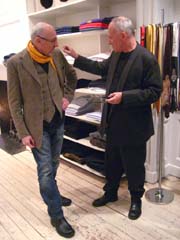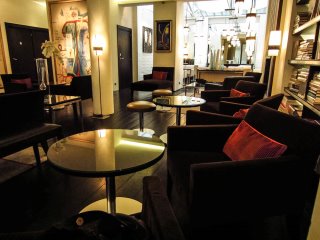The Crimson Garter is available at Amazon.com and at Kobobooks.
Stanley Moss is travel editor of Lucire. He has authored numerous books, including, recently, The Hacker.
Chapter 3
Robert Marsh stood up and walked to the window. He let his right hand, which held the article, drop to his side, while his left hand began to clench and unclench unconsciously. Far out at the end of the heath he caught a glimpse of Grace standing in the wind. As far as he knew she had not gone out for weeks. She was obviously on one of her long walks again, and he wondered just what her relationship was with the artist of Eastern European extraction. Marsh turned away from the window and faced his mother.
‘You might be interested in learning that this information has come to me from Sybil, Countess of Shortesbury.’ Lady Dorothea barked. ‘She informs me that many of her friends have booked passage to Paris immediately to see the painting for themselves. She invites me to go along. I suppose I should be glad that you have never revealed Grace’s true identity to our friends. But I made my opinion plain enough to you years ago when you announced your intention to marry an Italian performer. And now look what it has come to. It recollects my great disappointments with your scandalous behaviour during your university days, but this is far more serious, Robert, than mere gambling debts. This is no simple matter of a few games of whist and the loss of one’s Christmas money, no it is not. We are now faced with the prospect of horrible embarrassment. We must remove that painting from the public eye, Robert, at any cost. You must locate an agent who will arrange discreet purchase of it. However shall I face my friends from London if the extent of our relationship with Grace comes to public knowledge?’
‘No more needs to be said about this, mother. I will take care of it,’ he told her curtly. ‘You may leave it in my hands.’ And with that he exited the stifling room and returned to his study, where he brooded in silence.
Humphrey, Earl of Pinckney, stumbled up through the glen, along a heathery hillside. Looking to the top of the hill he was surprised to discover the figure of a lone woman clothed in black, silhouetted against the grey, cloudy afternoon sky.
‘I say, hello there!’ he called out in a jocular manner. ‘Rather brisk, eh? The wind has certainly picked up!’ He clambered up the hillside, panting, and stood next to her, gulping for breath. He looked at her face, which seemed rather familiar to him, but she presented such a dowdy picture that he could not place from where. ‘Have we not met before?’ he asked her. But she turned her face away, looking off in another direction. ‘Permit me to introduce myself,’ he offered. ‘I am Humphrey, Earl of Pinckney, a guest of Sir Robert Marsh. And you …’ here his voice trailed off in a leading manner.
Grazia looked back at the tall, rather lumbering man with a florid complexion, which she took to be his natural colouring if not due to his recent exertion. He had blundered up the hill to her in a ridiculous way, and now stood before her, gasping for breath. He was dressed in a rather subdued tweed which she noticed clashed with the garish paisley silk cravat at his throat. In his arms he cradled one of Roberet’s finest rifles, which he held quite correctly. She noted with amusement that he wore a pearl and diamond stud in the cravat. His hat had blown off his head, so he restored it somewhat askew, and looked a bit the clown the way he stood there. She reasoned he must be the presumptuous English Lord recently arrived, who had imposed himself upon their household. Robert had already grumbled he dearly hoped the man would shoot himself while out hunting.
‘I am Grace, Lady Marsh,’ she said. The man appeared to be greatly surprised at this, and he looked at her more closely than before.
‘I h-h-had heard that you were unwell,’ Pinckney admitted. ‘I say, I do hope you are feeling better.’ He flapped his arms about in the most unbecoming way, adding, ‘Jove, isn’t it getting on to tea time? A bit brisk out here, eh? Perhaps a glass of tawny port to drive away the chill, what?’
La Fragolina pulled her cloak about her. ‘I am still quite weary from a recent illness, and if you will do me the courtesy of escorting me to the door I will beg my leave from you there.’ Pinckney removed his hat with a flourish and made an exaggerated bow.
‘I shall be happy to escort you to the ends of the earth, Madam.’
‘Thank you,’ she answered politely. ‘The front door will be fine.’ During this exchange La Fragolina had discreetly placed into her pocket a letter, which had arrived only that afternoon, posted days earlier in Paris by the maid Bernadette.
As they walked back to the manor house La Fragolina went over what Bernadette had written. The letter reported great preparations under way for the Baron Schluysen-von Holstein’s yearly masked ball, to which the painter Balthazar was rumoured to have been invited. The news of this had made Grazia’s heartbeat quicken. If only she could find a way to Paris and attend the ball! She remembered the role she had danced of Persephone descending to the underworld. Like Persephone, she wished for the spring that would send her to the light again.
Pavel Erno, chief banquet waiter of the Hotel Czerny in Prague, peered out through the triangular cut glass window of the service doors from the kitchen, and studied the table for 40 which he had so lovingly assembled only hours before. It was desecrated, he thought, the magnificent feast which he had prepared for the wedding of the Count and Countess Kozlowski. His only consolation was that collected around the table were representatives from the oldest and most distinguished families in Prague and the surrounding country. No group of marauding Barbarians could have done more damage to a table than this noble group. Erno reviewed the menu card on which were recorded the enticing, mouth-watering dishes served to this crowd, who had with such dispatch obliterated hundreds of plates of food after only two hours. First came huge platters of fruits de mer, shipped in ice last night from the Adriatic. They had been accompanied by a dry Alsace wine. Afterwards, clear broth which he had carefully strained and strained again to make it pristine as an Alpine lake. Then came stuffed filets of sole, followed by another white wine, this time slightly fruitier. Immediately following, a lightly dressed salad of field greens, after which appeared delicately tiny balls of lemon sorbet served on mint leaves to cleanse the palate, washed down with light red Italian wine earlier decanted into 40 crystal flagons, which escorted roast guinea fowls, which preceded the two pièces de résistance, swan and suckling pig, presented on enormous silver platters. The swan of course was surrounded by flaming chestnuts and required a deeper red wine which Pavel had agonized over greatly, finally settling on an enchanting tokaj. After this came the customary cheeses and fruits, followed by the marvellous wedding cake of white almond paste and dark chocolate, served with the finest champagne from the hotel’s cellars.
At the centre of the table, now slightly worse for wear, was a splendid and heroic ice sculpture of one of the Countess’s favourite horses. Erno had ordered it fashioned it with the crown of the Kozlowskis on its head. One discreet white-gloved waiter attended each individual guest personally and he had recruited 40 of Prague’s finest for the event. He had even managed to borrow five of Prague’s foremost maître-d’s for this extraordinary performance. Serenading the magnificent repast were a dozen members of Prague’s symphony orchestra, who had come together to form a chamber group, to perform an overture specially commissioned by the Countess from a court composer named Slobowski. Pavel had personally found the overture execrable, yet the Countess and her coterie appeared to enjoy it.
The Count, who was also the groom, seemed removed from the proceedings. Throughout the course of the evening Pavel had noted that the Count ate little, and in fact looked dazed. One detail which Pavel found even more offensive was the presence of the Countess’s dog, who wore a collar studded with diamonds worth more than the combined yearly salaries of all the attendant waiters. The perfumed, manicured and pampered mongrel had made a nuisance of itself throughout the evening, managing to trip waiters, overturning plates and glasses wherever it went. She allowed it to wander wherever it wanted. There were times when Pavel was tempted to kidnap it to the kitchen and return it to the table in a more palatable guise—under a dark gravy and garlanded by glazed onions.
A loud exclamation of ‘Wuschi!’ was heard across the room. The dog had climbed upon the table and was lapping at the ice sculpture of the horse, much to the amusement of many. It was astounding to observe some of Prague’s most prominent aristocrats, normally public and stuffy figures, uninhibited at a private party. Take, for example, the portly Rupert Gerolstein, renowned for his collection of esoteric taxidermy. His figure overflowed the chair, where he lay unconscious, head thrown back, snoring loudly, a picture to which his wife remained oblivious, since she was deep in conversation with an American heiress whose nasal tones continually made a mockery of the beautiful Czech language. The Lord Mayor of Prague, who sat at the end of the table, seemed to be constructing a model of some new aqueduct he proposed to build on the southern frontier of town. His demonstration included several pepper pots, leftover potatoes and knives and forks simulating things Pavel did not understand. Even the Prince Dragobek II himself had graced the beginning of the banquet, and made an eloquent wedding toast. Perfunctory congratulations were rendered and the prince and his retinue hurried on to another engagement. It had been a singular honour for the Count and Countess Kozlowski.
As Pavel observed all this activity in horror, Count Laszlo Kozlowski was reliving the events of the afternoon preceding this nuptial banquet in much the same fashion. He felt some small consolation his friend Misha had remained in Paris. Misha had no real title, so it was unlikely that Gertrud would have countenanced his attendance in any case. The Count looked around at complete strangers whom he knew in a social way, but certainly never considered friends, and he marvelled at the magnitude of such a pitiful situation. Mercifully, the wedding ceremony had been brief, held in the private chapel of the von Thyssen estate. The Count had been overcome by the odour of incense, and by the plethora of flowers wedged into every available space of the rather tiny chapel. The Count had always hoped he would be able to marry for love, and that his wedding would be an emotional event. This ceremony was nothing more than a business transaction. No flowers or incense could cover the lack of joy that attended the coupling. Gertrud von Thyssen was no virgin, having been married and widowed before. The Count was horrified to see her enter the chapel in a turquoise blue gown cut in the equestrian style, with emerald at her ears and throat and a large cabochin diamond—which he had not purchased—on her finger. The ceremony was perfunctory, and the kiss even more so. After they emerged from the chapel, her friends and family heartily slapped him on the back and shoulders, he shook the obligatory hands, then waited politely at the sidelines. The bride was hustled away by her female friends to change from her monstrous gown into something only slightly less offensive, of a peach colour, also cut in the equestrian style. Count Kozlowski soon found himself in the carriage with the bizarre woman who was now his wife, and with whom he had barely exchanged a dozen words. The Countess leaned across the carriage to where he was sitting, and much to his surprise handed him a folded sheet of parchment, as the horses took off at a brisk canter.
‘Laszlo, darling, I have taken the liberty of scheduling some social engagements for the next few days which I think it would be delightful for you to attend.’
‘I see,’ said the Count, perusing the list, aware that every event related to horses. Horse shows, hunts, races and a visit to a stable—the purpose of which he could only guess was for Gertrud to purchase another steed for her own collection. ‘Is it possible that you require me at each of these events?’
‘You know, Laszlo, that your peculiar penchant for the bohemian life has hardly endeared you to the aristocracy of Prague. They do have a perverse curiosity, and I am sure they are looking for a good reason to humiliate me. You will need to watch your step. I am merely trying to help you restore not just your fortune, but your reputation.’ The Count squirmed uneasily. ‘You know,’ she blithely continued,’ if you had not gone off with your friend Misha in that impractical scheme of yours years ago none of this would have happened. And you might not be sitting here today. Your actions vis-à-vis the young Prince seriously imperilled your family fortune. When your father and mother died and you were not here to attend to their affairs your family lost everything. I am only trying to help. It was I who persuaded the Prince to pardon you for the sum of 50,000 gold ducats. And it was I who arranged for the repurchase of your family lands. Surely you could attend a few social events in order to right your position in Prague, to say nothing of lending support to my projects.’
At this moment the Countess’s dog awoke and began barking furiously. The horses’ response caused the carriage to lurch, which threw the dog into the Count’s lap. ‘Wuschi, my pet!’ cried Gertrud. With as much delicacy as he could muster the Count lifted the pampered canine and placed it back into the Countess’s receiving hands. ‘My poor poppet!’ she said. ‘Did the nasty Count frighten my poor poppet?’
The Count halted at this point in his recollections, for the orchestra in the banquet room had struck up a lively dance tune. All of the members of the wedding party who remained conscious leaped to their feet and began to choose partners. With a peal of delight Gertrud grabbed at the hand of the Count, dragging him to the centre of the dance floor. ‘Oh darling dearest it is we who must begin the dance! No one else can start without us!’ And as the lively tune began to float through the ballroom the Count found himself pulled and tugged and dragged across the dance floor, the Countess trying to lead him and stepping on his feet with utter abandon. All the other guests were oblivious, in such a drunken state that the Count had no worries of being scrutinized. This exuberant activity continued, until the Count’s toes were bruised and his calves and shins ached, and he was disgusted and breathless. ‘You do not like to dance, I observe,’ Gertrud said to him at the end of the evening. ‘Or perhaps you found some objection to the music. At any rate I hope you will at least in the future go along with these simple social conventions in the interest of our reputation. And now goodnight, Laszlo. I wish you a pleasant sleep, and I will see you for breakfast tomorrow morning in the dining room of the hotel, 7.30 a.m. Please do not be late.’
Pavel Erno still peered through the window of the kitchen door. He could tell the couple already had problems. It will never last, he thought, nodding to himself. Another beautiful meal, wasted, wasted.
Alone in his room later the Count sunk into a chair and directed his mind towards La Fragolina. Since he had given up the only token of her, which was the crimson garter, he wished for some other memento of her as a reminder. He took out a notebook and pen and ink and he began to draw her exquisite features from memory, her lithe body in various balletic poses, an effort to capture the essence of her expression and movement, to solace his own heart. He turned back to the sketches he made for the composition of The Crimson Garter and he sat for quite some time turning the pages, gazing at her likeness, until he felt he could fall asleep, and images of her filled his dreams.
If you wish to read ahead, The Crimson Garter is available at Amazon.com and at Kobobooks.
Related articles hand-picked by our editors
 John Pearse: for a lifetime
John Pearse: for a lifetime
Stanley Moss finds the ideal fabric—but it’s up to John Pearse of London to shape it into a bespoke jacket
 Two Parisian hideaways
Two Parisian hideaways
Stanley Moss looks at two distinctive Parisian hotels on opposite sides of town, with very different characters
photographs by Paula Sweet and courtesy Hôtel Le A
 What do you think about that?
What do you think about that?
Stanley Moss has alternative perspectives on previewing the Biennale di Venezia
photographed by Paula Sweet
Advertisement
Copyright ©1997–2022 by JY&A Media, part of Jack Yan & Associates. All rights reserved. JY&A terms and conditions and privacy policy apply to viewing this site. All prices in US dollars except where indicated. Contact us here.